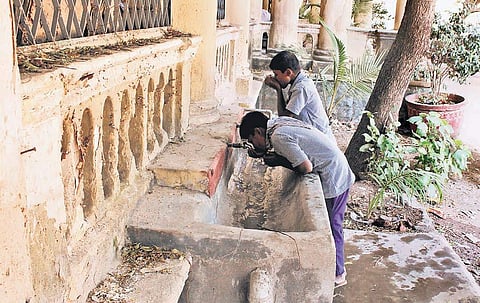

HYDERABAD: While in the last four and a half years, the TRS government had undertaken several initiatives to improve the quality of education in government schools, various reports -- both government and private -- published recently makes it look like the State government has only been selling half-truths.
The government had introduced digital classrooms in high schools, infused of ICT as part of pedagogy, brought in subjects like robotics in residential schools, and most recently, made over government schools by turning their walls into canvases.
However, it seems their efforts don’t prove much because the Unified District Information System for Education (UDISE), National Achievement Survey (NAS) by MHRD, and the Annual Status of Education Report (ASER) have thoroughly highlighted the poor quality of government schools in Telangana, with respect to infrastructure as well as quality of education being imparted.
In fact, compared to the data published in the UDISE for the academic year 2014-15, this year’s report revealed that not much has changed in government schools since TRS had come to power. One glaring example is that of computer availability in government schools, which has actually gone down to 36 percent from being 37.5 percent in 2014, as per the UDISE numbers. In secondary schools, it has increased slightly from 29 to 31 percent.
When it comes to matters of infrastructure in primary schools such as having boundary walls, single-room classrooms, playgrounds, and kitchen sheds, the data indicates stagnancy. While studies showed that there was a steady improvement in the performance of residential schools run by the social welfare department -- where just about 15 per cent of students studied -- other government schools like the zilla parishad schools were constantly ignored.
Another example is that of science laboratories in secondary schools. The percentage of schools having Physics, Chemistry, Biology, Computer and Maths labs have down to 17.6, 17.5, 16.9. 11.7 and 6.3 percent from 19.3, 19.2, 18.5, 12.7 and 8 percent respectively.
Poor quality of education
Various reports released in the last four years raised questions over the quality of education being imparted in government schools of Telangana. For example the NAS report released this year pointed out that performance of school students in Telangana in all the subjects was poorer than that of students from most districts of other southern states.
Even the Comptroller and Auditor General in its audit report released this year pulled up the Telangana government as it found that 14-26 percent children in primary schools and 21-47 percent children in upper primary schools scored less than 40 percent in the years 2014-17. It also pointed out issues like unhygienic conditions of kitchens in schools used for cooking midday meals.
TRS government can’t walk the talk?
It’s no news that the TRS government has never forgone an opportunity to talk about its achievements in residential educational institutions run by the social welfare department. Good performance of students in SSC exams, competitive exams, academic and extra-curricular initiatives has often been the talk of the town during TRS rule.
However, government teachers point out that these residential schools -- home to jus10 percent of the 22 lakh students enrolled in different government schools across the State -- are not run by the Department of School Education (DSE) and receive ample funds, as a result they deliver better results. The government is all-talk when it comes to these schools and mum when it comes schools that come under the DSE.
The stark difference could be seen in this year’s SSC results as the pass percentage in residential schools was above 90 percent whereas in zilla parishad schools it was just about 75 percent.
Telangana State United Teachers Federation, general secretary, Chava Ravi, said, “Around 20,000 teacher positions are vacant in government schools. The TRS government has not recruited a single teacher since 2014, even though the TRT was announced for 8,972 posts last year.”
“There are several schools where one to two teachers teach 5 classes and cover 18 subjects. Moreover, in this academic year, school maintenance funds have not been released yet by the State government and the amount is expected to go down with the merger of SSA (Sarva Shiksha Abhiyan) and RMSA (Rashtriya Madhyamik Shiksha Abhiyan).
Negative marks for TRS government on school fee regulation issue : Parents
Parents across the State have been crying hoarse demanding fee regulation. The Hyderabad Schools Parents Association (HSPA) has conducted many protests on this issue, including writing a post card to the Chief Minister and producing a song chiding him for not taking any action on the issue. The post even went viral on social media.
These protests and promises by the government -- especially the education minister -- notwithstanding, the TRS government has failed to address problems of exorbitant fee. The State government constituted a committee to look into the issue, headed by former Osmania University Vice Chancellor, Prof Tirupati Rao. The committee was formed in March 2017 and was supposed to submit its report in the next one month. It actually did so only in December. It’s a year since the report was submitted, but it has not been made public yet. The government did not even form the district fee regulatory committees.